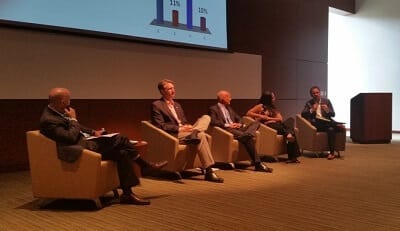Daniel Sullivan Joins Industry Leaders Discussing San Diego’s Energy Future


President and founder of Sullivan Solar Power, Daniel Sullivan, joined solar industry leaders in a panel discussion titled “San Diego Solar: An Energy Dialogue” presented by Cleantech San Diego and CohnReznick. Sullivan shared the stage with Heather Werner, Director of Strategic Initiatives at OneRoof Energy, Tom Brill, Director of Strategic Planning at San Diego Gas & Electric (SDG&E) and Scott Anders, Director of Energy Policy Initiatives Center (EPIC) at University of San Diego. The event provided perspectives from both sides of the meter on important clean energy issues and their impact on our region’s economy and environment.
Attendees were treated to an honest and diverse outlook, which focused on some of the most contentious issues facing San Diego’s sustainable energy future. The discussion opened up with a presentation from Scott Anders of EPIC. Anders referenced the previous night’s thunderstorms as a comparison to the history of the solar industry in San Diego. In 1999, just 10 solar systems were installed totaling 30 kW. Less than 18 years later, the San Diego solar industry is now comprised of 90,000 solar system installations equivalent to over 622 MW.
Anders highlighted the leadership of the San Diego region in the adoption of solar energy, citing how the SDG&E territory has consistently been the first to reach solar milestones in the state. However, while progress has been made in the adoption of sustainable energy just eight percent of the solar rooftop market has gone solar highlighting the future potential of the industry, which set the context for the subsequent panel discussion.
 Daniel Sullivan (far right) addresses the audience
Daniel Sullivan (far right) addresses the audience
Tom Brill of SDG&E raised the argument that non-solar customers were disadvantaged because of the growing transition of communities to solar power. Brill outlined that the current net metering billing arrangement represented a cost shift of $200 million. The validity of this figure was questioned by Sullivan as it was the same figure that was used by SDG&E years ago, prior to the recent changes to net metering which introduced new rules to amend for cost shifts. Following this, Brill acknowledged that the figure had not been updated since the previous research and was not an accurate reflection. Heather Werner of OneRoof dismissed the assumption that those who go solar impose a cost on those who have not. Werner referenced multiple studies across the country, which have found that solar energy represents a net benefit to all those in society.
Watch a video of the entire presentation below.
The claim that solar represents a cost shift was dismissed by the other panelists who outlined that distributed solar provides multiple benefits for both non-solar customers and the utilities. Sullivan expanded on this by outlining the current 600 MW of installed solar power in San Diego has meant that the construction of fossil fuel-powered plants was in many cases no longer required. This has saved SDG&E infrastructure costs of over $2 billion, highlighting that in fact “San Diegans are subsidizing SDG&E.”
Sullivan also highlighted the cost efficiency of distributed solar when compared to a centralized power plant, noting that electricity is of a higher value when generated at the location where it is to be used rather in a power plant where it needs to be transmitted hundreds of miles before it can be used.
Daniel Sullivan questioned whether a centralized system managed by fossil fuel interests was the best method to reach our future energy goals. This opened up a dynamic debate about the role of the utility in the energy future of the region. Anders outlined that with the advent of cheap and sustainable electricity from solar the last monopoly remaining for the utility is the grid. Anders debated that the future of the grid could conceivably be managed by a nonprofit, independent entity. Sullivan expanded on this concept and outlined that fossil fuel interests should not be responsible for managing the grid and that an independent operator for the grid is the best solution.
The 100 audience members who attended the discussion were treated to an insightful and interactive conversation on the future of energy industry in San Diego. While not all of the complexities of San Diego’s sustainable energy future were resolved, all panelists could agree on the important role that solar power has played and will play in meeting our energy needs effectively and safely.